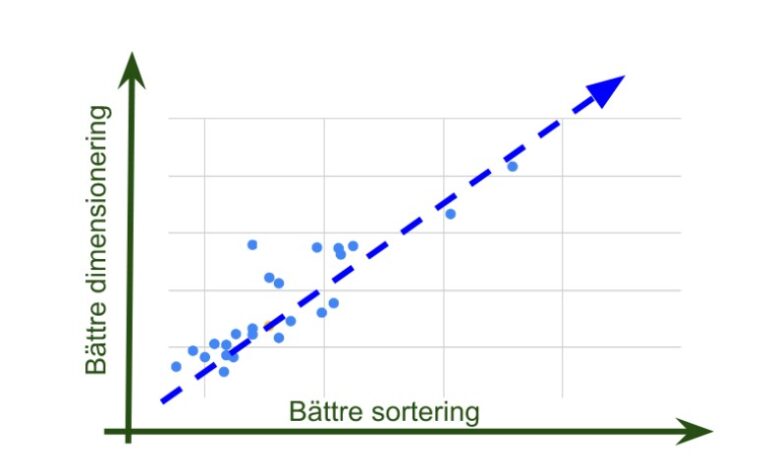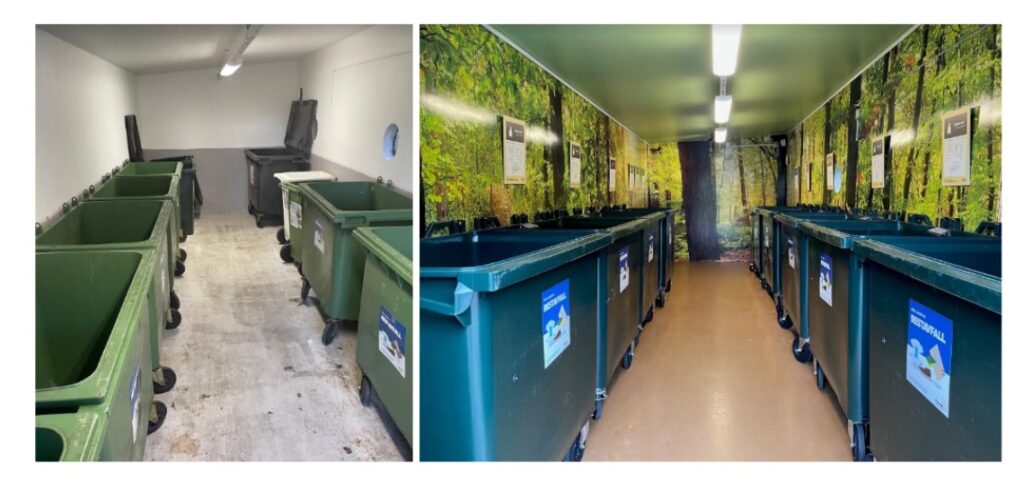We at Bintel think that it may not be a path that suits everyone, and that it is often difficult for housing companies to be swiped right. You simply have to find other ways to get black numbers on the last line.
At Bintel, we recommend that housing companies work with their waste costs. These costs have slowly but surely crept into the top list of biggest expenses for our housing companies. In the future, the avalanche of these costs is predicted to continue, as the cost of emission allowances will continue to skyrocket.
But what are the costs, and what can housing companies do?
Join us, and we'll get a little richer without any unwanted marriages in the bargain.
Waste tariff - expensive with Residual waste
Waste tariffs in Sweden are often environmentally controlled. By this we mean that as a housing company or private individual you do not pay outright what it costs to take care of the various types of waste. For example, food waste may currently be relatively expensive to recycle in economic terms, but the tariff is set so that it will still be profitable for a housing company to sort it out.
In our country, we see a wide variation among our customers in how profitable it is to sort. Two of our key indicators are:
- How much does sorting out a fraction save compared to putting it in the residual waste?
- How much do you save if you can reduce a residual waste bin from e.g. a Recycling room?
The picture is quite varied, with some municipalities finding it easier to save money than others. What is clear, however, is the trend - it is getting more and more expensive with Residual waste. The industry association Swedish Waste Management Association and our beloved Tax Agency agree. The price of allowances will increase at the same breakneck pace it has done over the past decade. A cost that is directly passed on to the arch-villain of CO2 emissions in Waste Management Industry: Residual waste.
Sorting pays off, work on getting the amount down Residual waste.
So, isn't Residual waste expensive in your municipality today? It will be soon. So efforts towards better sorting are likely to be very profitable today, and certainly in the near future.
What will have an effect, how to avoid being dependent on a rich partner?
At Bintel, we've connected hundreds of Recycling room and are analysing what works and what might not. Each Recycling room is linked to unique individuals, with different sorting cultures linked to the environmental spaces. It is therefore a challenge to pinpoint any individual factors that increase sorting and reduce your costs, but we will at least make an attempt to list 3.
1. Understand your pick-up points
Collection points behave very differently. We see variations across seasons, holidays and the people associated with the pick-up points. What we see everywhere, regardless of the sorting starting point, is that people can and often want to do better. However, getting better requires knowing your strengths and weaknesses.
When you collect data and create an understanding of your waste situation, you can identify where you have undercapacity, for example, or where you need to target your communication efforts.
Undercapacity
One weakness we often find is under-capacity for packaging, which simply cannot be handled with the volume of containers available. This under-capacity leads to a vicious spiral of littering, increased amount of Residual waste and resignation to sorting among residents.
Making room for overflowing packaging fractions often leads to very high residual waste reductions. We typically see figures of up to 20% less Residual waste, when under-capacity fractions are addressed. The soon-to-be-classic image below shows how residual waste increases sharply, when paper and plastic packaging containers are overflowing.

Communication
In Bintel's analyses, it is possible to filter out which sorting stations in a municipality or housing stock are working well and which are causing a lot of costs and environmental impact.

This insight enables action where it is needed, and within the factions that stand out. Instead of shooting wide with a shotgun, you can be as bulletproof as Robin Hood.
This has the effect of saving money on unnecessary efforts. Furthermore, it can improve, and tailor, interventions to where they are really needed.
If you, as a communicator, knew how well or badly you sort in a specific Recycling room, would that affect your communication with residents?
2. Structure is key
What we can see in our data analysis is that you get little of what you ask for. If you dimension for poor sorting, well, then you end up with a lot of Residual waste and a lot of littering.
Some housing does not signal that source separation is serious, this by having a large overcapacity for Residual waste and only a few "alibi bins" for Food waste. Then you cannot expect residents to develop a sorting culture either.
Here is an example of how some 40 Recycling room in a municipality sort in relation to how "well-sized they are". Many things affect how well-sorted a collection point is, but the trend below shows that sizing is an important thing to have in place. To have a handle on what waste streams you have today, and keep up with how these change over time.

3. Behaviour is E and I
Behaviour linked to source separation is a huge concept, which we at Bintel are working to understand. Every day. If we boil it down to what fits in this text, it is: "Work at it, it pays off". Test, measure and evaluate. Then share and learn from others in the industry.
In many of our projects, housing companies and sanitation services are investing in information, clear labelling and making environmental spaces a little nicer than the grey, smelly bunker they once were. In these projects, the effect is also clear. Both on the sorting rate and on the last line of the financial statements.
In one of our projects, the housing association completely transformed its Recycling room and reduced residual waste by 20%, a figure we often see in the first stages of improvement. A reduction that delivers annual savings, well above the initial transformation cost.

So money isn't everything, but it's nice when there are financial and environmental incentives that go hand in hand. That's often the case in our industry.
Contact us, and we'll have a chat about how your rooms can move towards "ecological independence".

